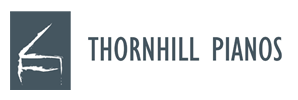How do you choose between Feurich and Yamaha pianos to find the best fit for your needs? Yamaha is a large and familiar Japanese brand widely recognised across the world, while Feurich is a smaller but increasingly well-known European manufacturer producing high-quality upright and grand pianos.
What Sets Feurich and Yamaha Pianos Apart?
The most notable differences between Yamaha and Feurich pianos are in tonal quality and price.
Yamaha pianos are known for their clear, neutral tone, suitable for a wide range of musical styles. This makes them versatile and widely accepted. In contrast, Feurich pianos have a rich, powerful, warm European tone. Many pianists find this particularly well-suited for classical music (especially from the first Viennese school) and jazz.
When it comes to pricing, Yamaha models are generally 30–50% more expensive than the equivalent Feurich models:
- Feurich Model 122 (122 cm): £6,000
- Yamaha U1 (121 cm): £9,500
- Feurich Model 133: £8,000
- Yamaha U3 (131 cm): £11,000
Cosmetic Differences and Frame Colours
There is one important cosmetic difference between Feurich pianos and Yamaha pianos. The vast majority of Feurichs have the traditional Viennese warm copper-coloured frame (similar to Bösendorfer), with the exception of the modern-style chrome-framed option. In contrast, Yamahas typically feature a gold-coloured frame.
This may seem unimportant, but if you play a grand piano with the lid open, you may spend many hours at your most creative staring at the frame in a concentrated state. Make sure you like the frame colour – it might matter more than you think.
The Legacy and Craftsmanship of Feurich
Feurich upright models (115, 122, 133) and grand models (162, 179, 218) are primarily produced in Ningbo, China, allowing for excellent build quality at very reasonable prices:
- Uprights: £5,000 to £8,000
- Grands: £12,000 to £25,000
In Vienna, Feurich also handcrafts the Made in Vienna Model 123, featuring a custom Renner action with:
- Innovative KAMM design for fast repetition
- Adjusted capstan heights to match key geometry
- Sumptuously rich tone and highly responsive touch
At £11,000, the Model 123 compares favourably with elite European brands such as Bechstein, Blüthner, Bösendorfer, and Steinway.
Yamaha’s Engineering and Global Reach
Yamaha manufactures its extensive piano range across six factories in Japan, China, Taiwan, Indonesia, and the USA. From the compact B1 upright (109 cm, ~£4,000) to the flagship CFX concert grand (£150,000), Yamaha offers options for every stage of a pianist’s journey.
The brand is known for its:
- Precision engineering
- Technological innovation (e.g. silent systems, digital integration)
- Consistency and reliability
Much of this is possible due to Yamaha’s vertically integrated production, meaning it manufactures nearly all components in-house. This efficiency helps maintain quality but also contributes to higher pricing.
Yamaha’s bright, clear sound is especially favoured in contemporary, pop, and jazz genres. The U series is well-established and trusted in professional studios and institutions.
Yamaha’s Action and Institutional Preference
At the high end, Yamaha’s C-series, S-series, and CF-series grands are celebrated for their action precision and build quality. These pianos are often selected for concert halls and music institutions around the world.
That said, many recording studios prefer Feurich for its warm, musical tone. Feurich now offers a strong alternative to Yamaha’s longstanding market dominance.
Longevity and Maintenance
Both Yamaha and Feurich produce pianos built to last decades with proper care. Regular tuning and regulation by a skilled piano technician is essential to maintain tone and playability.
Feurich vs Yamaha – Quality and Value Compared
The entry-level Yamaha B1 upright is smaller than the Feurich Model 115. Feurich deliberately avoids making uprights smaller than the 115, as it believes anything smaller compromises string length and action performance.
So while the Yamaha B1 retails around £4,000 and the Feurich 115 around £5,000, these aren’t directly comparable instruments. However, both are suitable for beginners and still responsive enough to reward experienced players.
The Feurich Model 122 is widely regarded as the sweet spot for quality and value. Costing £6,000, it delivers impressive tone and balance. It is used by respected London studios including:
- Abbey Road Studios
- Angel Studios
- Livingston Studios
- Urchin Studios
- Westpoint Studios
Their feedback consistently praises its recording-friendly tonal quality.
Silent Systems
Adding a silent system costs around £2,000 for both Yamaha and Feurich. However, Yamaha’s system replaces the middle pedal, while Feurich retains the mute pedal separately from the silent system – a small but potentially meaningful difference.
Feurich’s Handcrafted Appeal
The acoustic quality and durability of Feurich pianos make them a sound long-term investment. Whether you are a beginner or a seasoned pianist, we can help match you with the ideal Feurich instrument.
Pianos are complex, with thousands of parts. That’s why tuning, regulation, and voicing are so important, especially with Feurich’s rich tonal characteristics. We prepare every piano to the highest standards so they sound their best in your space.
Find the Perfect Piano for Your Needs
Ultimately, the best way to choose is to try the pianos in person. We invite you to make an appointment at our London workshop to explore the Feurich range and get expert advice on finding the perfect piano for you.

